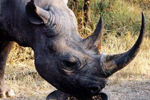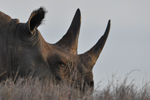
White rhinos in Namibia. White rhinos are the world’s most populous, but suffer massive poaching rates. Photo by: Ikiwaner.
Four hundred and fifty-five rhinos have been killed by poachers in South Africa since the beginning of the year. The number surpasses the record set last year (448) and proves that national efforts to stem poaching have not yet made a dent in actual killings. The mass killing has been spurred on by high demand for powdered rhino horn in Vietnam and China. A traditional curative in Asia, rhino horn has no medicinal properties according to scientists.
While poachers have killed 455 rhinos in the past nine-and-a-half months, increased law enforcement efforts have arrested 207 suspects linked to the black market trade.
Kruger National Park, the jewel in the crown of South Africa’s park system, has become the epicenter of the rhino poaching crisis. Fifty nine percent of the rhinos killed this year were in Kruger or 272 individuals.
South Africa is home to more rhinos than any other country, which is why it has become such a target for the illegal trade. The country has around 2,000 black rhinos (Diceros bicornis) and over 18,000 white rhinos (Ceratotherium simum).
Poaching coupled with habitat loss has decimated rhino species worldwide. Four out of the world’s five rhino species are considered threatened with extinction by the IUCN Red List. Three of these—the black rhino, the Sumatran rhino, and the Javan rhino—are listed as Critically Endangered. Last year saw two rhino subspecies declared extinct: the western black rhinoceros (Diceros bicornis longipes) and the Vietnamese rhinoceros (Rhinoceros sondaicus annamiticus), a subspecies of the Javan rhino.
Related articles
The riot over rhinos: how a luxury and illegal commodity is driving the slaughter of one of the world’s iconic megafauna

(10/15/2012) 23,680 = the estimated number of wild rhinoceroses in South Africa. 35,000,000 = the number of American dollars generated by rhino hunting in South Africa. 97% = the percentage increase in illegally-hunted rhinos in 2011 from the national average in 1990. 30,000 = the number of pounds of rhino horns confiscated from poachers since 2010. 65 = the number of horns that have been stolen in South Africa from public display. 430…the number of rhinos killed this year, and counting…

(10/02/2012) So far this year, South Africa has lost 430 rhinos to poachers, more than one animal a day. The epidemic of rhino poaching, fueled by demand for black-market powdered rhino horn in Vietnam and China, is decimating rhino species worldwide. In fact, last year saw the official extinction of two rhino subspecies: the Vietnamese rhino (Rhinoceros sondaicus annamiticus), a subspecies of the Javan, and the western black rhino (Diceros bicornis longipes), a subspecies of the black. However there is one place where rhinos still thrive. The Lewa Wildlife Conservancy in Kenya has found itself with a unique, but happy, problem: they have so many black rhinos, which are considered Critically Endangered by the IUNC Red List, that they need to move some to stop rhino-fights. In other words, their rhino population has hit its limit for the 25,000 hectare (62,000 acre) nonprofit protected area.
Wildlife trade bans may be worsening trafficking of some species, argues paper
(09/18/2012) While founded with good intentions, wildlife trade bans may in some cases be worsening the plight of some endangered species, argues a commentary published in the journal Tropical Conservation Science.
Yuppies are killing rhinos, tigers, elephants
(09/07/2012) Yuppies, not elderly rural consumer, are driving the trade that is decimating some of the world’s most iconic endangered species, including tigers, elephants, rhinos, pangolins, and bears, said experts meeting at a workshop in Vietnam.